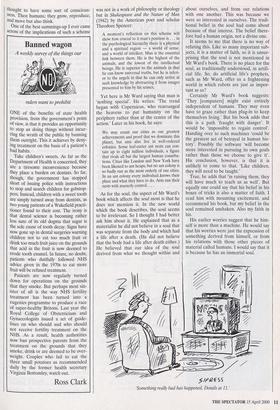Banned wagon
A weekly survey of the things our rulers want to prohibit ONE of the benefits of state health provision, from the government's point of view, is that it provides an opportunity to stop us doing things without incur- ring the wrath of the public by banning them outright. This it achieves by deny- ing treatment on the basis of a patient's bad habits.
Take children's sweets. As far as the Department of Health is concerned, they are a tiresome inconvenience because they place a burden on dentists. So far, though, the government has stopped Short of issuing police with instructions to stop and search children for gobstop- pers. Instead, children with a sweet tooth are simply turned away from dentists, as two young patients of a Wakefield practi- tioner found to their cost. The irony is that dental science is becoming rather less sure of its old dogma that sugar is the sole cause of tooth decay. Signs have now gone up in dental surgeries warning children not to eat too much fruit or drink too much fruit juice on the grounds that acid in the fruit is now deemed to erode tooth enamel. In future, no doubt, patients who dutifully followed NHS advice given in the 1970s to eat more fruit will be refused treatment.
Patients are now regularly turned down for operations on the grounds that they smoke. But perhaps most sin- ister of all is the way NHS fertility treatment has been turned into a eugenics programme to produce a race of super-healthy Britons. Last year the Royal College of Obstetricians and Gynaecologists issued a set of guide- lines on who should and who should not receive fertility treatment on the NHS. As a result, health authorities now ban prospective parents from the treatment on the grounds that they smoke, drink or are deemed to be over- weight. Couples who fail to eat the three small potatoes as recommended daily by the former health secretary Virginia Bottomley, watch out.
Ross Clark


































































 Previous page
Previous page